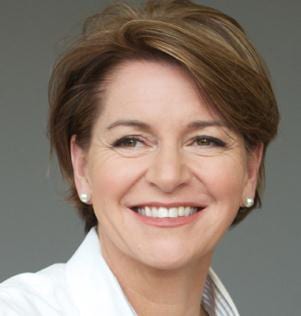Martha Hall Findlay sounds defeatist, at first.
“I keep hearing this view among Liberals that all we have to do is do this, or all we have to do is do that, and we’ll get back to power,” she says. “There’s no such thing.
“We need to get out of the sense that we can get back to governing with quick fixes.”
Hall Findlay is vying to become the next leader of the Liberal Party of Canada, and she’s looking to give the party — and the country — more than just a nip and tuck. She wants the Liberals to take their medicine.
Hall Findlay, last-place finisher in the 2006 leadership race despite an impressive grassroots campaign, seems better poised this time around. Most pundits, herself included, have put her in the top tier of the candidates, alongside Justin Trudeau, Marc Garneau and Joyce Murray.
The Toronto native has hit some controversial points in the campaign, coming out in opposition to the decades-old system of supply management — a complicated thicket of tariffs, quotas and price controls that benefit a small cartel of about 10,000 Canadian dairy farmers — much to the chagrin of some in the agricultural sector.
She talks at length about overhauling our tax code and medicare. She wants an independent appointment board to fill the Senate with capable community leaders, instead of partisan hacks. She wants to tackle the infrastructure and transit “deficit” plaguing our cities, thanks to a 150-year-old tax code.
Hall Findlay hardly takes a breath during a spirited diatribe on how a generational shift threatens to collapse the house of cards that is our retirement system, unless Canada gets serious.
“We’re actually going to have to take some big action on this,” she says at the end of her spiel. “This may not sound sexy, but it’s really important.”
The one-time MP represented the Toronto riding of Willowdale from 2008 until 2011. Her experience in the private sector has ranged from retail management, to corporate law, to telecommunications consulting. But more than just her resumé, she’s highlighted her leadership style as one of her best assets.
“You need a prime minister who has guts,” she says.
Martha Hall Findlay in her own words:
Winning: “We all know the dynamic of this race. Everyone is assuming that Justin is so far in front . . . that’s not necessarily what we hear on the ground.”
Sex work: “I’ve actually been fairly public on saying that it should be legalized. Same with marijuana. When you talk about harm reduction, there’s no way that you can reduce harm by putting things underground.”
Marijuana: “I do not support decriminalizing marijuana. Because decriminalizing doesn’t actually address the fundamental problems of trafficking; it doesn’t address the problems of regulation. In my view, that’s half-assed. We really do need to do full legalization. There’s absolutely no reason why marijuana shouldn’t be treated the exact same way we treat alcohol.”


 Why you can trust Xtra
Why you can trust Xtra


